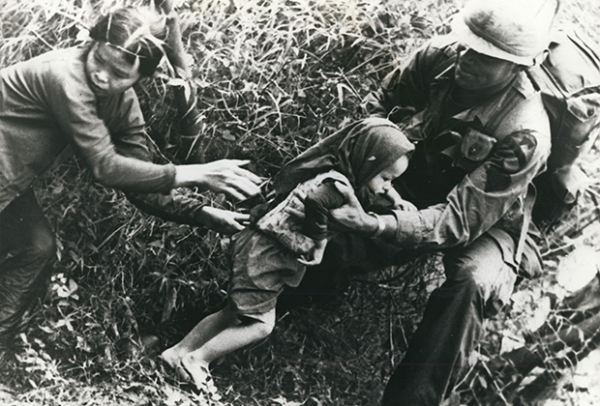
The experts who benefit from armed conflict
What happens to the economy when the war begins? The price of war? Can it be profitable for someone. and is there any people who on it earn? To these and other questions tried to answer the head of the Economics program of the Carnegie Moscow center Andrei Movchan, Dean of the faculty of Economics at the University in Magdeburg, Vice-President of the Foundation Naumann Foundation, Karl-Heinz paqu and the head of the program “international politics” of the Moscow higher school of social and economic Sciences Vasily Zharkov in the course organized by the Yegor Gaidar Foundation discussion “Economics of war”. “Ribbon.ru” wrote down the main points of their speeches.
Who and why need war
Andrei Movchan:
In the history of mankind war directly involved in the conflict has always been a very unprofitable game with a negative amount. Once it starts, it means that somewhere something is very seriously broken.
Reasons for it a little. First of all, it is the deep confidence of one of the parties that it has overwhelming superiority. Today war is generally unlikely, but not because there are no empires and small States, but because they began to reassess their losses. Now developed Empire believes that life is a hundred of its soldiers lives are more valuable than the couple of million soldiers underdeveloped countries.
There are also situations in which there is a third factor that threatens the loss is so great that you go to war in order to neutralize him and get lesser loss. In particular, a classic example is the beginning of the great Patriotic war. The distrust between the two dictators has resulted in the confidence of Hitler that Stalin would start a war. Why almost hopeless the beginning of hostilities against the Soviet Union was still less risk, because the Soviet position had been strengthened, he could soon unleash a conflict, and Germany will lose for sure.
There are positive third-party factor, when, first, someone is asking you to go to war and promises to compensate for the loss with a vengeance, and secondly, when you and your opponent have different opinions. For example, in the Soviet-Finnish war the territory ceded under the peace agreement to the USSR, was significantly less important for Finland than the potential loss of life, while for the Soviet Union strategically even tremendous sacrifices were justified.

The Ukrainian military on the ground near Zhitomir, 2015
Photo: Valentin Ohyrenko / Reuters
Of course, a major cause of many wars is the Agency conflict, when some stratum or the elite inside the society receives the benefits, while society as a whole loses. So, in the Russian-Ukrainian conflict on both sides there is a set of agents: from the well-known Bone Malofeyev as an individual agent to entire large groups of security forces and groups of people in Ukraine.
On the other hand, remember the second war between the United States and Iraq. There is extensive evidence that one of the agents of this war was Halliburton, which received orders for restoration of the Iraqi oil industry by about $ 100 billion.
A classic example of an agent of influence is the so-called war of despair, when the elite or ruling group in the country unleashes the conflict to stay in power. Thus, the German economy in the mid-1930s, was incredibly similar to the Russian economy now, they even had their Kudrin and Gref, saying exactly the same thing. On the background of GDP growth they had ration cards and population quickly impoverished. Military mobilization, war was the only way out of the situation.
As in any game, you can get into what is called the mousetrap when the parties involved in the situation, the output of which is worth more than the curriculum. A classic example is the escalation of hatred within the society to an external source of problems. At some point society overshoots the brink of no return, and the regime is unable to control the situation, because the people demand war.
Beneficiaries of war
In my opinion, in the modern world leads to wars, first of all, the influence of external third — party beneficiaries to people outside of their space. What could be the motives? For example, this weakening of the parties involved in the war, if we are talking about some third party trying to buy the elite, to push them to the conflict, to misinform and so on. Here can play a role and protect their interests. For example, the government and groups ruled South Vietnam, actively involved the Americans in the war, at the expense of a third party to attempt to defend at least part of what they wanted to defend.
Sometimes a very important thing in business is the increased risk. High margin appears only where there are high risks (e.g., drug trafficking). Therefore, the territory of Afghanistan is unlikely to be peace in the near future, it’s too important to have instability, uncontrollability, opacity.
The same is connected with the problem of realization of their products. The presence of war it is necessary for manufacturers of weapons like from the point of view of increasing demand for their goods directly and indirectly: the more wars, the more risk, the more we arm the country. On a local war attracts a large number of experts from different countries to see how the new weapon system. Very often they supply in the theater of military operations free of charge or at very low prices for validation of these technologies that makes it easier to sell them or adapt.
Moreover, the war may be conducted in the interests of a particular market or increase the prices of goods in the market. While it is possible to blockade trade routes for the worsening conditions of doing business for competitors.
There is, of course, ideological provocation, because society is peculiar aberration of consciousness. And there is a high level of misinformation, as in the case with the history of Halliburton in Iraq. This is a classic example, when an operation of disinformation was carried out at the highest level.
The population in the war loses, as both an active participant in the conflict. Internal agents also lose often, but the outer in direct contact is rare. Never lose external agents in indirect contact, which is not even seen in the war itself.

The Suburbs Of Damascus
Photo: Omar Sanadiki / Reuters
In some cases, war is impossible
The main enemy wars — the statistical growth of foreign trade. War never starts when exceeding a certain level of foreign trade between the two countries, because such amounts cannot be sacrificed. In particular, therefore Russia with the EU will never enter into armed conflict.
The increase in individual welfare is another barrier. There is a formula by which the probability of war between countries is inversely proportional to the product of the squares of the welfare of citizens in those countries. So a good way to avoid armed conflict — the stimulation of the growth of material welfare of citizens.
Another barrier is the frequent turnover of agents. There is a very clear link between the average number of years of stay in power of one group and the number of wars in which participating country. The shorter this period is, the less conflict. In the U.S., the turnover is extremely quick, but a lot of wars, just because there are only two agents. Parties in Europe more generally, and the turnover is better, it’s much less fighting.
In addition, a very serious obstacle to war is Blagovest countries. The States that comprise the military units, very rarely go to war, except for wars, which they are when they have an overwhelming advantage. But conflicts with the overwhelming advantage of being progressively eliminated, as the stronger party pays in such a situation a higher price.
What form will be taken by the war
Gradually fall price war. For the civilized world a drone or cruise missile is much less valuable than private Ryan. Therefore, on the one hand, there is a tendency to increase the likelihood of wars, because rates start to fall — you can just send somewhere many rockets and see what happens. On the other hand, it also turns war into a completely different type of opposition — the so-called non-lethal confrontation or subversive war, hybrid war, which we are now observing. The no of contours of the fronts, and it is unclear who is fighting whom.
A large number of wars in the world occurred because of so-called petrogradskii, when the country accumulated surpluses of material and financial resources in connection with the sale of the minerals. Now these resources have significantly declined and are unlikely to rise. Therefore, most likely, the number of wars will decrease, the country will move to other, non-military methods of interaction (for example, recently the concept of geo-Economics).
Of course, a very rapidly changing competitive advantages of States, every ten years appears their new palette. The fight becomes stupid, because until you did, changed competitive situation, and have to fight elsewhere.
A rising share of wars despair, when the destabilization of the situation in the state leads to war with a neighboring power. This applies especially to regions where there is low resource rents and low per capita GDP. In the so-called “red box” (from zero to 6 thousand dollars per capita GDP, and from zero to 12 percent the share of natural resource rents in GDP), all the time war and the “color revolutions”.
Since increases the amount of invincible blocks in the center of which are nuclear powers, the price of armed conflict will grow, which will lead to decrease in their number. Geo-economic war and sanctions that can actually be scarier than bombs, have already come to the fore. As you can see on the situation with Iran, even very severe limitations can force a country to change their behavior.
Karl-Heinz Package:
I would be very careful with the hypothesis that causality, first, the economic growth of the war and, secondly, inequality of war. Growth means prosperity, and for me the turning point here is the First world. It began after forty years of continuous growth of all major industrial countries, including Germany, because of the terrible failure of diplomatic methods. So these factors can not warn against the emergence of some really stupid conflict.
The second thesis — about the inequality and war. If to analyze the situation in the Arab countries, Syria is not the poorest country in the world, as this region is not the poorest on the planet. There are other forces, the public mood, able (or unable) to affect radical Islam.
Black Africa — the region is much poorer, but there is not happening of such events. The same is true for Ukraine and Russia. So I think the world is much more complex in this respect, and I’d better not give too much importance to the economic factor in war.

Ukrainian special forces after the exercises, 2015
Photo: Valentin Ohyrenko / Reuters
War as a factor of uncertainty for the economy
War from an economic point of view is a huge reallocation of resources: in times of peace, the priority is given to the consumer market, and military — the production of means of destruction. Arms manufacturers win in the conflict, and other goods — lose, although this is not always immediately noticeable.
Many historians, especially historians-Marxists, appealed to this fact as evidence that most of the wars of movable material interests of the military industrial lobby. In a sense they are right, but in many cases, conflicts are often ideology and imperialism, not just the economy. It certainly plays a role, but do not give it much importance.
There are two wars, economic results and long-term consequences of which are obvious. The first example is the Vietnam war, and the second concerns Russia, this Ukrainian conflict.
The Vietnam war lasted about ten years. What did it mean for American society? First, during all this time the country was fully engaged with the military theme. Even in Germany the conflict was all the time at the hearing, and what can we say about US! Why the obsession with the war on a psychological, political, sociological level was huge.
Secondly, when it ended, Americans felt extremely humiliated. The ideological goals set by the authorities to justify military action, have not been achieved. Because Americans, in principle, not used to losing, for them it became extremely painful experience. Thirdly, war is very detrimental to the economy of the United States.
It should also be remembered that the US in the 1950’s — early 1960-ies was the dominant economy in the world. When, in 1973, began the final phase of the Vietnam war, the national debt of the States amounted to the enormous sum, and in the end, it partially benefits were monetised. Failed previously regularly worked the Bretton woods system, with its rigid exchange rates and gold prices, followed by high inflation.
It spread to Germany, which had already experienced one severe hyperinflation in the early last century. German society was not ready to accept it and had massive resistance. In the spring of 1973 a system of rigid exchange rates ceased to exist. It was another humiliation for America, and following the collapse of the Bretton woods system years were very difficult not only for us but for the entire global economy.
So in this example I can’t find any positive economic effect. Mass obsession, ideological confrontation eventually led to the humiliation of American society. In a sense, the West is still not fully digested the implications of this defeat. The weakness that showed the us economy was the main result of macroeconomic imbalances.
Now about Russia. I’m not talking about the political course of the country, but the situation here is clearly reminiscent of neo-imperialism, expressed through the attempt to destabilize or control the regions that your country considers a zone of its interests. Here is the main reason for the conflict lies not in the economy.
What will be the consequences? If to speak very briefly, then, in my view, primarily the Russian economy will be faced with new challenges. She is now heavily dependent on oil and gas revenues. Over the past 10-15 years, the per capita income has increased significantly thanks to sales of hydrocarbons. Such a model is unsustainable in the long term, oil prices are falling, and many experts believe that such situation will last still long enough. In other words, the freebie ended. We need new sources of income, structural reforms in the economy, a departure from the production of weapons and petroleum products.
I think that, first of all, if Russia wants prosperity, but now she is following the wrong path. The current old-fashioned imperialist thinking does not work in the context of globalization, it prevented the country from fulfilling himself as a high-tech, innovative and modern country.
So in basic terms, today’s Russia (like the US in the 1960s, during the Vietnam war) drew attention to different distractions and cannot step on the right path. For the authorities now is the time to recognize this fact, otherwise (if this situation will continue to evolve, thinking will not change, and oil prices will remain at current level if a new innovative economic model is not created) your country will remain uncompetitive nation with an average economic indicators, young people will continue to leave in search of greater prospects.
To the current situation should be treated with caution. Although in the short term picture is quite harmless, in the future, Russia could face devastating consequences, not only in the economy. Imperialistic ambitions without a stable economy cannot exist, such a state cannot be strong and influential.
Historically, no war did not solve any economic problems, and so do not build illusions on this score. I don’t know any situation where direct or indirect financing of wars has led to steady growth.
War as a natural part of life
Vasily Zharkov:
There is an opinion that war is a manifestation of the archaic. Unfortunately, it is not. War is a natural part of the human condition. Mankind has no single, unified state, it is impossible in a world in which there is war of all against all.
As much as we belonged to armed conflict, they were and are in the history of mankind, and that’s part of the political process. If we follow Hobbes, even the absence of hostilities is a war, because then when we are ready for war when we are going to participate in the war — this is war.

American infantryman helps to run woman, and child from the war zone in Vietnam, 1967
Photo: Keystone Pictures USA / Zuma / Globallookpress.com
After every major military conflict of the XX century, mankind had made a pretty serious steps towards peace, including implementing the majority of the Kantian principles that have become for us today practice. In particular, of course, the most important outcome of the Second world war was mentioned here of the Bretton woods system.
All the last six-seven decades, we have seen obvious optimistic projections of increased international cooperation. There are so-called strong international regimes: the currency regime, the regime related to trade, the modes associated with reception (I’m not talking about last year), but today these principles are another challenge.
We as always have two choices. One may lead us to greater cooperation and more successful institutional solutions at the international level. Second, as evidenced by Immanuel Kant in 1895: the possibility of the universal destructive war, as a result of its development as a factor in relations between people.








